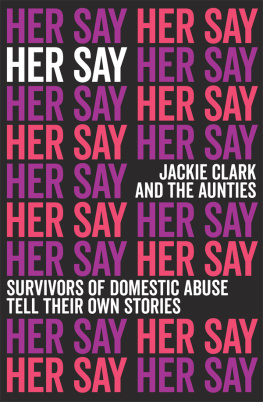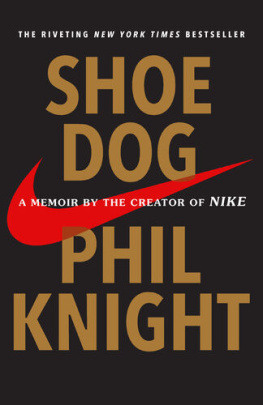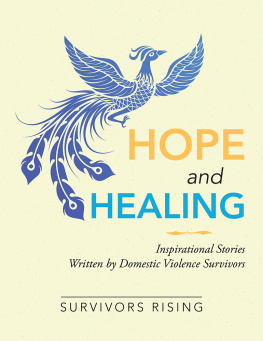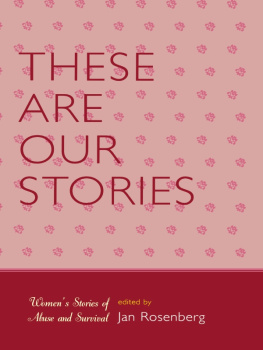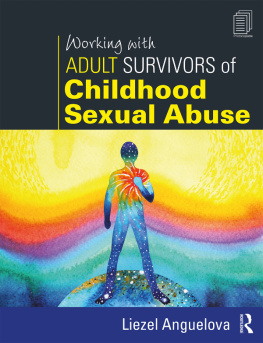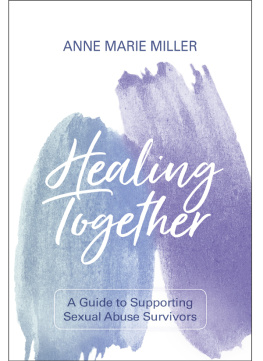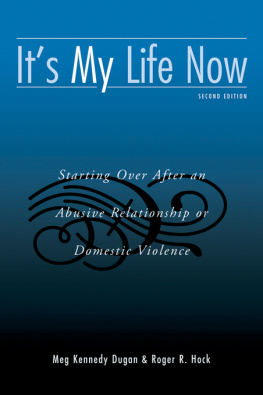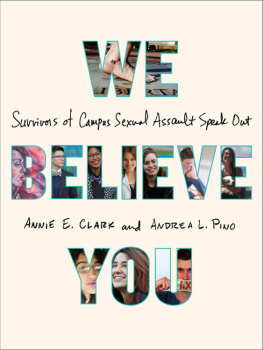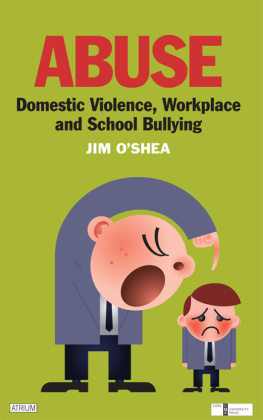Clark Jackie - Her Say: Survivors of Domestic Abuse Tell Their Own Stories
Here you can read online Clark Jackie - Her Say: Survivors of Domestic Abuse Tell Their Own Stories full text of the book (entire story) in english for free. Download pdf and epub, get meaning, cover and reviews about this ebook. year: 2013, publisher: Penguin Random House New Zealand, genre: Home and family. Description of the work, (preface) as well as reviews are available. Best literature library LitArk.com created for fans of good reading and offers a wide selection of genres:
Romance novel
Science fiction
Adventure
Detective
Science
History
Home and family
Prose
Art
Politics
Computer
Non-fiction
Religion
Business
Children
Humor
Choose a favorite category and find really read worthwhile books. Enjoy immersion in the world of imagination, feel the emotions of the characters or learn something new for yourself, make an fascinating discovery.
- Book:Her Say: Survivors of Domestic Abuse Tell Their Own Stories
- Author:
- Publisher:Penguin Random House New Zealand
- Genre:
- Year:2013
- Rating:3 / 5
- Favourites:Add to favourites
- Your mark:
- 60
- 1
- 2
- 3
- 4
- 5
Her Say: Survivors of Domestic Abuse Tell Their Own Stories: summary, description and annotation
We offer to read an annotation, description, summary or preface (depends on what the author of the book "Her Say: Survivors of Domestic Abuse Tell Their Own Stories" wrote himself). If you haven't found the necessary information about the book — write in the comments, we will try to find it.
Clark Jackie: author's other books
Who wrote Her Say: Survivors of Domestic Abuse Tell Their Own Stories? Find out the surname, the name of the author of the book and a list of all author's works by series.
Her Say: Survivors of Domestic Abuse Tell Their Own Stories — read online for free the complete book (whole text) full work
Below is the text of the book, divided by pages. System saving the place of the last page read, allows you to conveniently read the book "Her Say: Survivors of Domestic Abuse Tell Their Own Stories" online for free, without having to search again every time where you left off. Put a bookmark, and you can go to the page where you finished reading at any time.
Font size:
Interval:
Bookmark:


WHY DIDNT YOU JUST LEAVE?
A simple question, but theres no easy answer.
Abuse can take many forms it can be physical, mental, sexual or a horrifying combination. It can be absolutely blatant, or it can be slippery and easy to hide.
In these pages, sixteen women tell their personal stories of messy, complex, truly human lives and how they managed to get back enough control to move forwards on their own terms.
Her Say is spoken from the heart, uncompromising but offering hope, redemption, personal triumph. Its a book for all women, showing how owning our stories gives us the power to write daring new endings.
Part of the healing is finding your voice, and telling your story These women have found their voices, and now you need to hear them. Michle ACourt
The Aunties is a grassroots charity helping women to rebuild their lives after trauma, assisting with material needs as well as providing emotional support. Aunty in Charge, Jackie Clark, has long dreamed of a publication that gives these women a voice. Her own story is included in these pages.
All royalties from the sale of this book go to support the work of The Aunties.
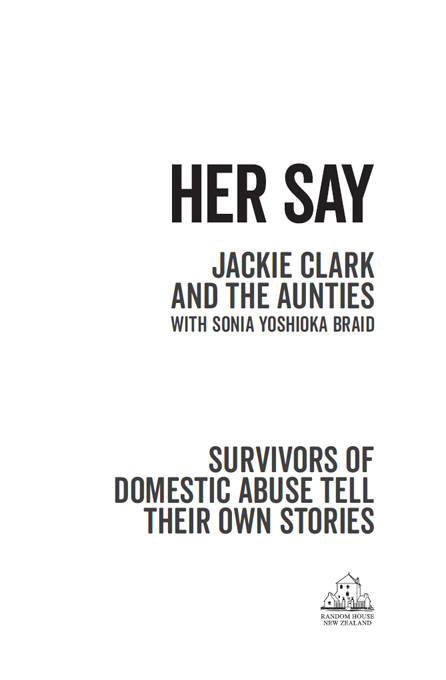
For Carol, who always saw me and loved me fiercely and without limits.
Heres the thing about domestic violence it is hidden behind closed doors. People living it, and perpetrating it, often go to great lengths to keep it invisible and silent. Children are told to keep it secret. Neighbours turn a blind eye. Friends and family dont ask. Women learn not to speak.
Refuges, too, are secret places hidden away in the community for reasons of security and safety. We dont like to ask too many questions of the women and children who live there. Not asking for details feels like good manners, or a protection of privacy, and maybe were afraid of what we might hear.
But part of the healing is finding your voice, and telling your story.
Dont be frightened of these stories. Sure, they are confronting and raw, and there is darkness, but there is also a lot of light shining through the pages. And incredible wisdom. These women have found their voices, and now you need to hear them.
Michle ACourt
SEVEN YEARS AGO, I RANG A LOCAL REFUGE. At the time, I was working as a kindergarten teacher and we had some clothing I thought might find a new home. I went and had a chat with Kris, the refuge co-ordinator, and we talked about what their needs in the refuge were. She got talking and this planted the seed that formed the nucleus of The Aunties. Through the power of social media, we have brought together diverse sectors of the community and opened up some passionate conversations around what giving can really look like.
The idea for this book came about six years ago, after a visit to the women staying in the refuge. We were sitting on the veranda and they asked me to tell them my story, so I did. When I finished, they said to me, You should have been in a place like this, and I thought, Oh fuck. Thats when I stopped minimising what I had been through with my husband, Ian. I talked this over with Michle ACourt and she planted another seed to write a book telling stories that had never been told before.
At The Aunties, we have a very strong kaupapa of giving with love and without judgement, and our Aunties donate in a variety of ways financially, professionally, and by providing goods or their time and support. We also consider the term to be gender-neutral anyone can be an Aunty. We have approximately 300 regular donors, with other folks donating as and when they can. Over the past seven years, our Aunties have enabled the whnau we work with to experience wonderful Christmases, eat properly on a regular basis, have access to cultural, educational and sporting opportunities, get drivers licences, obtain or fix the essential cars in their lives, and rediscover what fun can be.
The Aunties work alongside women and whnau who are seeking to heal from domestic violence, and the stories in this book reflect just how remarkable these whine toa are. Every person has a connection with The Aunties, and you may be surprised to know that not all stories are from Mori or Pasifika women. I am deeply grateful to everyone who has shared their story for this book.
Domestic violence doesnt discriminate on the basis of age, ethnicity or gender, and in Aotearoa New Zealand it has been at epidemic levels for some time. The statistics only show the tip of the iceberg, and even they are chilling:
domestic violence is the leading cause of death by homicide for women in Aotearoa New Zealand;
at least one-third of women in Aotearoa New Zealand have experienced physical or sexual-partner violence in their lifetimes;
one in four women from high-income households has experienced physical and/or sexual-partner violence in their lifetimes;
at least one in 10 New Zealand men has experienced childhood sexual abuse;
every four minutes, there is a call-out to the police and government agencies for a domestic-violence incident;
an estimated 76 per cent of domestic-violence incidents go unreported.
Domestic or family violence is an umbrella term that includes (but is not limited to) intimate-partner violence, child abuse and neglect, elder abuse, abuse of siblings, parental abuse, and violence against disabled people.
Domestic violence is any behaviour that in any way controls or dominates a family member, and causes them to fear for their own or another family members safety or well-being. It can include physical, sexual, psychological, emotional or economic abuse, and any behaviour that causes a child to hear, witness or be exposed to the effects of that behaviour. It occurs within a variety of interpersonal relationships, including those between partners, parents and children, siblings, and other relationships considered to be family. It can be a single incident or a pattern of behaviour (source: New Zealand Family Violence Clearinghouse, www.nzfvc.org.nz).
But the textbook definitions and statistics cant convey the hurt and the pain that survivors of domestic violence feel. They dont reflect the social and financial impact that occurs when people have to move constantly to be safe from perpetrators, leave jobs, or are simply unable to function due to the stress that living in domestic violence causes. It doesnt even start to cover the intergenerational harm that plays out as children learn how to behave at the hands of their abusers.
The way The Aunties operates has changed over the course of its seven years. We listened to the whnau we work with and adjusted accordingly. We were delighted to shake up the charity space in Aotearoa New Zealand when it came to charity and tinned tomatoes. We invited people to think about giving from a position of empathy and compassion, not demanding gratitude for the expired tins of sardines they no longer wanted. We moved the discussion from being grateful for what youre given to giving what is asked for and needed. It caused a furore at the time, but also opened the door to some really useful conversations.
We know that those conversations will continue as The Aunties continues to evolve. My ultimate aim is to have the women who have received support from The Aunties eventually run the organisation, bringing their experience and wisdom as they support others.
Font size:
Interval:
Bookmark:
Similar books «Her Say: Survivors of Domestic Abuse Tell Their Own Stories»
Look at similar books to Her Say: Survivors of Domestic Abuse Tell Their Own Stories. We have selected literature similar in name and meaning in the hope of providing readers with more options to find new, interesting, not yet read works.
Discussion, reviews of the book Her Say: Survivors of Domestic Abuse Tell Their Own Stories and just readers' own opinions. Leave your comments, write what you think about the work, its meaning or the main characters. Specify what exactly you liked and what you didn't like, and why you think so.

